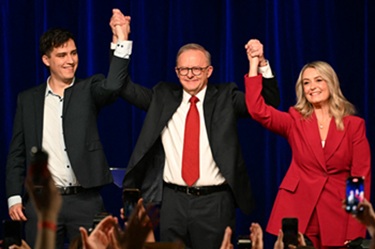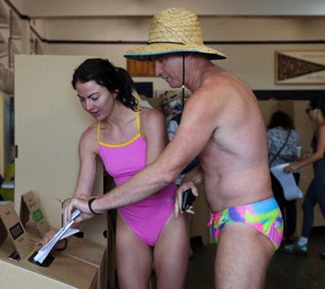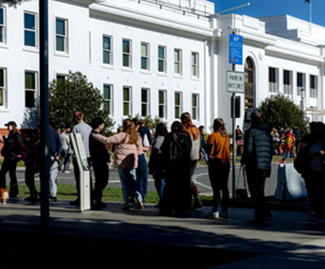Australian election 2025 has some striking similarities with Canadian election five days before (compliments of current strange politics in USA)
May 5th, 2025 | By Greg Barns | Category: Countries of the World
GREG BARNS SC. HOBART, MELBOURNE, BRISBANE, PERTH, AUSTRALIA. MONDAY, MAY 5, 2025. Newly minted Canadian Prime Minister Mark Carney and his Liberals have something in common with the winner of Australia’s national election on Saturday, Anthony Albanese and the Australian Labor Party (ALP). Both brought their governments back from the brink of defeat partly because of the Trumpian tinge of the conservative opposition parties.
Mr Albanese, Prime Minister since 2022, led his party to a thumping victory – one not predicted by even the most optimistic of polls. With votes still being counted, a product of Australia’s preferential voting system, Mr Albanese’s party, at the time of writing has won 86 seats in the 151 seat house of representatives, with the Liberal and National Party Coalition reduced to 39, and with minor parties such as the Greens (1) and independents (11) holding the rest. 12 seats are still close to call.

In an extraordinary coincidence like the Conservatives Pierre Poilievre, Mr Albanese’s opposite number Peter Dutton lost his seat in suburban Brisbane.
As recently as six months ago Mr Albanese and his government was heading for defeat. The Prime Minister would have been the first since James Scullin in 1931 to lose government after one term. And that was in the middle of the Great Depression. Going into this election campaign, as in Canada cost of living issues and interest rates were dominant, and the Coalition parties fuelled so called ‘culture wars’, capitalising on the disastrous Constitutional referendum championed by Mr Albanese in 2023 that would have given Indigenous Australians an advisory voice in the national parliament.
But then came Donald Trump and, it has to be said, a distastrous campaign by Mr Dutton. Mr Dutton, like Mr Poilievre, tried to distance himself from President Trump, but when under pressure in the election campaign reverted to Trumpian rhetoric and tactics, including blaming what he called ‘hate’ media.
While Mr Albanese has been circumspect in his handling in the Trumpian world, particularly on the 10 per cent tariff imposed on Australia, Mr Dutton was telling Australians he would be a better bet to deal with the narcissistic and chaotic American President.

Not only that but Mr Dutton was on the record as recently saying that “[Trump] is a big thinker and a deal maker. He’s not become the president of the United States for a second time by being anything other than shrewd. You’ve seen it in his business life, and the art of the deal is incredibly important to him.”
Recently, the veteran political commentator Anne Davies, in the Guardian newspaper, chronicled Dutton’s Trump type policies.
While not proposing an equivalent of Trump’s DOGE, Dutton appointed a hard right member of his team, Jacinta Price, to be shadow minister for government efficiency. The Coalition promised to sack 41,000 public servants which is a big number when you consider the federal bureaucracy is only 185,000.
And who would be prime targets for the chop? Those who are responsible for “culture, diversity and inclusion advisers, change managers and internal communication specialists” because they “do nothing to improve the lives of everyday Australians.”

But in another sign of his poor campaigning skills, Mr Dutton started to walk away from his slash and burn pledge, by talking about ‘natural attrition’ and hiring freezes. Just as Trump has begun to walk away from his hard line on tariffs.
Then there were the attacks on renewable energy. Mr Dutton’s answer to climate change mitigation was to build mini nuclear reactors, the first of which wouldn’t come online for at least 10 years.
And Dutton embraced the Trumpian ‘culture wars’ rhetoric. He clumsily waded into the issue of the Acknowledgement to Country ceremony held at most official functions around Australia these days and which remembers the Indigenous peoples’ prior and continuing ownership and connection to the land. It is used too much, said Dutton.
And there were other disasters that befell the former hardline Immigration Minister. He announced that working from home would stop. To put it mildly women voters were unimpressed – so then came a huge backflip.

By contrast Mr Albanese’s campaign was, like Mr Carney’s, measured and focused. He stayed out of the ‘ideological’ territory Mr Dutton carved out, instead promising greater access to Medicare, the government run health care system, and eliminating and reducing tertiary education fees. The Reserve Bank (the Bank of Canada’s equivalent here) cut interest rates and inflation dropped – all timed nicely to blunt cost of living rises line of the Opposition.
There are, of course, differences between the Canadian election and Australia’s. We do not have the 51st state threat to contend with, but what can be said is that voters in both nations are seeking stability in a turbulent world and Trump like politics is unwelcome.
And the significance of Mr Carney’s win was not lost on Australians. Mr Albanese was asked about it and said that “Mark Carney has stood up for Canada’s national interest, I stand up for Australia’s national interest. I look forward to building on the relationship that I’ve already built.”
Australia and Canada’s relationship might be about to get a lot closer because the temperament of the two nation’s leaders could make it so.
Greg Barns is a former adviser to Liberal governments in Australia and the author of Rise of the Right: The War on Australia’s Liberal Values (2019).


